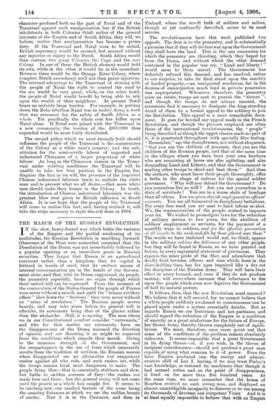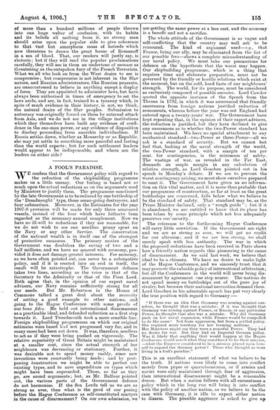THE MARCH OF THE RUSSIAN REVOLUTION.
IN the slow, heavy-footed way which befits the vastness of the Empire and the partial awakening of its multitudes, the Russian Revolution is marching forward. Observers of the West were somewhat surprised that the Dissolution of the Puma was not immediately followed by a popular uprising or an immediate panic in Russian securities. They forgot that Russia is an agricultural continent rather than a. kingdom, that its capital is fettered in bonds of steel, that its swiftest means of internal communication are in the hands of the Govern- ment alone, and that, with its Puma suppressed, its people, the peasantry especially, have no organ through which their united will can be expressed. From the moment of the convocation of the States-General the people of France were never without a mouth, and until the "bronze artillery officer" shot down the " Sections " they were never without an "army of revolution." The Russian people moves heavily, and may take years before its general will is effective, its movement being that of the glacier rather than the avalanche. Still, it is moving. The men whom we in our Constitutional comfort consider "extremists," and who for that matter are extremists, have on the disappearance of the Duma resumed the direction of opinion, and are directing it as might be expected from the conditions which impede their march. Owing to the immense strength of the Government, and the unsparingness in the use of force which necessarily results from the tradition of serfdom, the Russian masses when disappointed see no alternative but sanguinary rushes against all who rule, and such rushes are, while the troops remain loyal, most dangerous to make. The people being Slav—that is, essentially stubborn and slow, but liable to sudden accesses of fury—the rushes are made here and there ; but the general rising will not come until the prairie as a whole has cauglit fire. It seems to be catching now, one marked feature of the scene being the amazing distances at which we see the sudden bursts of smoke. Now it is in the Caucasus, and then in Finland, where the revolt both of soldiers and sailors, though as yet confusedly• described, seems to be most serious.
The revolutionaries have this week published two appeals. The first is to the peasantry, and is substantially a promise that if they will declare war upon the Government they shall have the laud. This is the one concession for which the peasantry are thirsting, which they hoped for from the Puma, and without which the other demand contained in the popular war cry, "Land and lilberty ! " would seem to them unreal. The Government has definitely refused this demand, and has resolved, rather to our surprise, to take its final stand upon the sanctity of lauded property,—an unexpected resolution, for in the decrees of emancipation much land in private possession was expropriated. Whenever, therefore, the peasantry seize an estate, troops are sent to punish the " rioters " ; and though the troops do not always succeed, the extremists find it necessary to dissipate the long-standing dread of them by a formal appeal to the soldiery to join the Revolution. This appeal is a most remarkable docu- ment. It goes far beyond any appeal made in the French Revolution, and though the phrases employed are often those of the international revolutionaries, the " people " being described as though the upper classes made no part of it, it is penetrated throughout with specially Slav feeling. "Remember," say the draughtsmen, not without eloquence, "that you are the children of peasants, that you are the children of the Russian people, and that at the same time in the villages where you were born your own brothers who are remaining at home are also agitating, and also demanding Land and Liberty, and that the Government is sending other troops to shoot and beat them." And then the authors, who must know their people thoroughly, offer a bribe in the shape of redress for the special soldier grievances. "Why will you defend the Government ? Do you yourselves live so well ? Are you not yourselves in a state of servitude ? You are in a worse state of bondage than all others. You are given slavish employment as officers' servants. You are all tormented in disciplinary battalions. For every free word you are sent to hard labour or shot We, the representatives of the people, wished to improve your lot. We wished to promulgate laws for the reduction of military service to two years, for the abolition of soldiers' employment as servants, for the payment of a monthly wage to soldiers, and for the effective prevention of all insults to the rank-and-file by those placed over them." The words we have italicised would not, we think, appear in the military &tiers des doleances of any other people, but they will be found in Russia, as we have pointed out before, in every regimental statement of grievances. They express the inner pride of the Slav, and adumbrate that deadly feud between officers and men which, born in the slave-holding time, has for ages impaired like a dry rot the discipline of the Russian Army. They will have their effect in every barrack, and, even if they do not produce mutiny, will everywhere increase that reluctance to fire upon the people which even now deprives the Government of half its natural powers.
It follows, then, that the new Revolution must succeed? We believe that it will succeed, for we cannot believe that a white people suddenly awakened to consciousness can be placed again under a system essentially Asiatic. But as regards Russia we are historians and not partisans, and should regard the reduction of the Empire to a condition of anarchy as a great misfortune for the future of Europe, her States being thereby thrown completely out of equili- brium. We must, therefore, once more point out that some of the conditions of the problem remain absolutely unknown. It seems impossible that a great Government in its dying throes—or, if you wish, in the throes of incipient convalescence—should not produce a great man capable pf using what remains to it of power. Even the later 2mpire produced one, the energy and admini- strative skill of Leo I. having, if we may trust Finlay's vast knowledge, so restored its machinery that though it had seemed rotten and on the point of disappearance, it lived on for more than five hundred years. At the same time, we must remember that the house of Bourbon evolved no such strong man, and displayed an almost unintelligible incapacity to discover or to use among its thousands of devotees one competent Vizier. And it is at least equally impossible to believe that with an Empire Of more than a hundred millions of people thrown into one huge welter of confusion, with its habits and its beliefs all melting from it, no strong man should arise upon the popular side to give coherence to that vast but amorphous mass of hatreds which now threatens to drown the great house of Romanoff in a sea of blood. That, our readers will justly say, is rhetoric; but if they will read the popular proclamations carefully, they will see in them an undertone of menace as threatening as the outspoken fury of the French Terrorists. What we all who look on from the West desire to see is compromise ; but compromise is not inherent in the Slav nature, and Russian administrators, like Russian peasants, are unaccustomed to believe in anything except a display of force. They are appointed to administer laws, but have always been authorised in times of emergency to set the laws aside, and are, in fact, trained to a tyranny which, in spite of much evidence in their history, is not, we think, the natural desire of the Slav peoples. Submission to autocracy was originally forced on them by external attack from Asia, and we do not see in the village institutions which they themselves have built any evidence of confi- dence in the one-man power, or any evidence of disposition to disobey proceeding from anarchic individualism. If Russia settles down, whether as Monarchy or as Republic, she may yet settle to something more peaceful and lasting than the world expects ; but for such settlement leaders would appear to be indispensable, and where are the leaders on either side ?







































 Previous page
Previous page